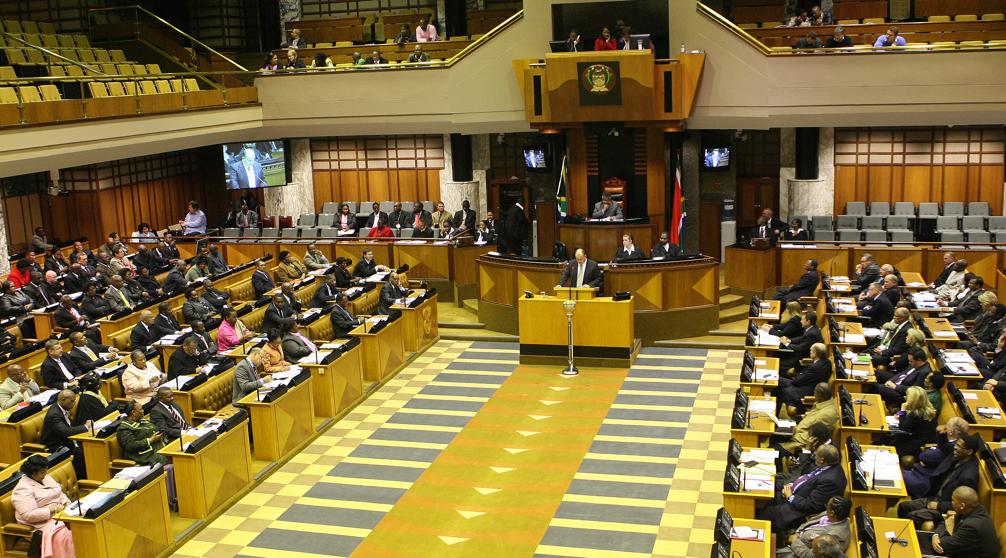What Parliament can do to help the millions trapped in poverty

Former president of South Africa Kgalema Motlanthe is leading a panel probing how legislative reforms can accelerate much-needed change
The ills of the colonial and apartheid past are being reproduced in post apartheid SA despite extensive legislative reform, the high-level panel on the assessment of legislation and the acceleration of fundamental change has found.
Appointed 21 months ago by the Speakers Forum — the representative body of the legislative sector — the panel was tasked with assessing the content and implementation of legislation since 1994 to determine its effectiveness and possible unintended consequences.
Chaired by former president Kgalema Motlanthe, the panel’s members include Evidence Based Solutions CEO Olive Shisana, University of Cape Town (UCT) economics professor Haroon Bhorat, UCT Graduate School of Development Policy and Practice professor Alan Hirsch, FirstRand founder Paul Harris, former auditor-general Terence Nombembe and former UN Human Rights commissioner Navi Pillay.
They held public hearings, commissioned reports from experts and ran workshops to delve into issues before issuing its report on Wednesday.
While legislative reform since the end of apartheid has improved the lives of South Africans — the mortality rate of children under the age of five has improved, as has access to education, for example — the panel found the changes have “not dented the deep inequities in the quality of services received” nor had they made fundamental shifts in outcomes.
“Thus, in some areas, society appears to be ‘progressively realising’ the inclusive vision of the Constitution, while in others there is a need to accelerate fundamental change,” the panel’s report reads.
Despite the Constitution guaranteeing a range of socioeconomic and related rights, redistributive fiscal policies and an extensive social safety net, the triple challenge of poverty, unemployment and inequality remains “deeply etched” in SA and still reflects the racial, spatial and gender character “bequeathed by apartheid”.
The panel’s recommendations offer direction on how to bring about accelerated change in relation to poverty and inequality, land reform, social cohesion and nation building.
In testimony from the public and experts, the panel was “confronted with evidence of weaknesses” by the government in executing policy and legislation.
“These breakdowns in execution occur despite an extensive machinery designed to monitor the executive and to hold it accountable for outcomes,” reads the report.
“This brings into focus questions concerning the effectiveness of governance and accountability mechanisms, including the role of Parliament in providing oversight.”
The persistence of poverty was one of the most important themes emerging from the panel’s public hearings. People who testified “overwhelmingly” ascribed it to an absence of employment opportunities.
“SA’s wealth is concentrated in the hands of a few, leading to a country being highly unequal in terms of not just income but also assets. This is largely due to the legacy of apartheid,” reads the panel report.
“If this unresolved apartheid situation is not urgently resolved, it is likely to create conflict between the masses of people and those who have disproportionate wealth, threatening to disrupt the social cohesion that was built as part of the end of apartheid. The situation can be averted if proactive solutions are found that do not destabilise the country,” it adds.
The panel recommends that Parliament reviews the implementation of the Special Economic Zones Act 16 of 2014 to see how it could be optimised to create special zones for manufacturing production destined for export, with appropriate incentives and exemptions.
Parliament is urged to encourage the government to prioritise agricultural development as it could generate more jobs for rural people and contribute to economic growth.
The panel also suggests that Parliament enact amendments to competition legislation that would boost the powers of economic regulators to promote competition and discourage government policy and action that stifle competition.
Parliament should also ensure “the next budget appropriations” include resources for supporting informal traders and upgrading their trading places with suitable infrastructure and storage space.
It should also support legislative efforts to support the advancement of capital to new or small businesses, with emphasis on equity and royalty-based financing schemes, in addition to loans.
The panel urges Parliament to pass legislation that will require the state to invest resources to gradually develop low-end tourism destinations in rural areas and the periphery where the majority of the population lives.
It recommends that Parliament conduct a fresh review of the unabridged birth certificate requirement for minors in consultation with all role players in the tourist industry.
Entrepreneurship can be encouraged through an attempt to improve the ease of doing business, especially for small and medium-sized businesses, the panel says.
It recommends that emphasis be given to reducing the time to register a new business, including getting appropriate permits and telephone and electricity services, registering a property and accessing state sources of business development funding.
The panel also recommends that enterprises below a certain size (in terms of number of employees) be exempted from certain regulations, including the obligation to pay the minimum wage and specific components of black economic empowerment legislation.
People below a certain age, those who have been unemployed for a long time, people in rural areas and the disabled should be employed without the company being required to pay the minimum wage on the same terms — the panel recommends the setting of a separate wage for the vulnerable.
The panel also recommends that Parliament guides the overhaul of SA’s skills development policy so that it responds to participation in a globally competitive environment that requires a high skills base, and a local context that creates low-wage jobs to absorb the large numbers who are unemployed or in vulnerable jobs.
To align the basic education sector to the economy’s needs the quality of the senior certificate should be improved to adequately prepare pupils on an academic career path for entry into higher education and professional careers.
A track should also be created to channel the majority of pupils to vocational educational career paths.
While enrolment in technical vocational education and training (TVET) colleges more than doubled from 358,000 in 2010 to 794,000 in 2013, the design of TVET qualifications needs to be aligned with employer needs and adjusted to improve employability on completion of studies by restructuring the practical component.
The panel recommends reducing the classroom blocks at TVET colleges to allow more on-the-job experience from the first year of study.
“Education, on its own, is not a panacea for developmental challenges,” the panel concludes. “But without a high-performing public education system, millions of people will remain trapped in poverty and locked into dependency on the state.”
